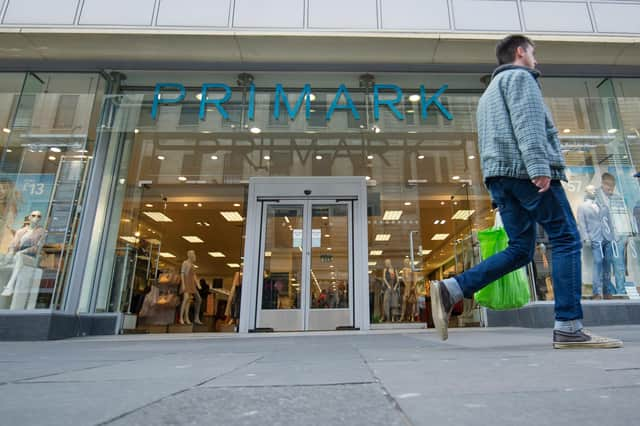Primark furloughs 68,000 staff and says sales have collapsed to zero


Chief executive George Weston said the group had been “squarely in the path of this pandemic”, but would not reopen Primark stores until the disease is under control.
The budget fashion business relies entirely on in-store sales and has seen its takings plunge from some £650m a month to zero as Covid-19 has caused the 376-strong chain to shut completely across Europe.
Advertisement
Hide AdAdvertisement
Hide AdHalf-year results showed pre-tax profits slumped as Primark was left with piles of stock it was unable to sell amid the global shutdown, falling 42 per cent to £298m in the six months to 29 February.
Total charges in the first half leapt to £309m, compared with £79m a year earlier, including the £248m stock costs.
On Monday, Primark revealed that it had agreed to pay an additional £370m to suppliers to cover stock currently in production or yet to be delivered after facing criticism over order cancellations during the health crisis.
The fashion chain said the deal will cover products which were in production or due for shipment by 17 April, having previously committed to pay for orders which were in transit or booked for delivery by 18 March.
Bosses also set up a fund to support the thousands of garment workers affected.
Weston laid bare the “human tragedy” of the crisis as he reported the half-year figures, revealing that two of the group’s employees have died from Covid-19 in the past three weeks while another remains in intensive care in the US.
AB Foods said the timing of when it will reopen stores was uncertain and that the process will also be “complex”, but will only be done so when it its safe.
The group’s food and agriculture business – spanning sugar, grocery and ingredients, including brands such as Twinings tea and Kingsmill bread – is helping it weather the crisis while cost cutting will also help it mitigate half the operating costs of Primark while stores remain shut.
Advertisement
Hide AdAdvertisement
Hide AdWeston told investors: “Much as I would love to be allowed to reopen Primark stores across the UK, continental Europe and the USA soon, because lockdown has so harmed our business and our supply chains, I know that we must not do so until we have suppressed this disease.
“When we are allowed to reopen we must make our Primark stores safe for our staff and our customers, even if that means ensuring there are fewer people shopping at any one time and so accepting lower sales at least until the remaining risk is minimal.
“In time we can rebuild the profits. We can’t replace the people we lose. I am in awe of the Primark teams for their care, good judgement and immense hard work as they have managed this crisis.”
Richard Hunter, head of markets at Interactive Investor, noted: “AB Foods has produced a measured response to the effects of the pandemic, battening down the cost hatches wherever possible and consolidating those parts of its business where some sort of earnings visibility is still possible. Unfortunately, its flagship retail operation cannot be overlooked.”
Meanwhile, John Lewis sales have plunged after it was forced to shut stores in the face of coronavirus despite a surge in online orders.
The John Lewis Partnership group also said its Waitrose supermarket chain saw sales surge as shoppers stocked up on essentials.
However, the John Lewis department store business saw total sales tumble 17 per cent in the weeks since 15 March, after it closed all its sites on 23 March. The high street retailer warned that a worst-case scenario would see the chain’s annual sales plunge 35 per cent.
Nevertheless, John Lewis said online sales have jumped 84 per cent as shoppers purchased more technology and food preparation products.
Advertisement
Hide AdAdvertisement
Hide AdThe retailer said demand has particularly spiked in some of its “less profitable lines”, with people “buying more Scrabble but fewer sofas”.
Elsewhere, Waitrose sales rose 8 per cent in the period since 26 January as supermarkets were buoyed by the crisis.
Comments
Want to join the conversation? Please or to comment on this article.